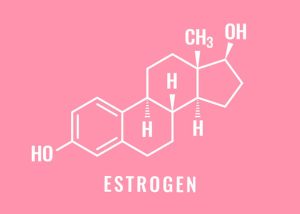Estrogen’s Profound Influence on Brain Health, Mood, and Cognition
Estrogen, traditionally recognized for its role in reproductive health, plays a significant role in brain function, affecting memory, mood, and overall cognition. Research indicates that fluctuations in estrogen levels can impact various cognitive processes, emotional well-being, and even social relationships. Understanding these effects allows individuals to seek appropriate care and adopt lifestyle strategies to maintain cognitive health and emotional stability.

Estrogen’s Influence on Cognition
Estrogen directly affects cognitive functions, particularly verbal memory—the ability to learn and recall information. Studies have shown that during periods of high estrogen levels, such as certain menstrual cycle phases, pregnancy, or hormone therapy, women often experience enhanced verbal memory and increased brain connectivity. Conversely, reduced estrogen levels during menopause can lead to cognitive challenges such as brain fog, slower processing speed, and memory lapses. These shifts highlight estrogen’s vital role in maintaining neural health and cognitive function.
Neurologically, estrogen modulates neurotransmitter systems, including acetylcholine, dopamine, and serotonin, all of which are essential for memory, learning, and mood regulation. It also promotes neuroplasticity—the brain’s ability to adapt and reorganize itself—which is crucial for learning new skills and maintaining cognitive function as we age.
Mood Regulation and Emotional Well-being
Beyond cognition, estrogen significantly impacts mood and emotional stability. Fluctuating estrogen levels, especially during perimenopause—the transition phase leading to menopause—can trigger mood swings, anxiety, and depressive symptoms. Notably, some women may experience depression for the first time during this period, even without a prior history. Research suggests that estrogen has a protective effect against mood disorders by regulating serotonin and dopamine levels, which influence happiness and emotional balance.
Estrogen’s influence on mood can also be observed during premenstrual syndrome (PMS) and postpartum depression, where hormonal fluctuations contribute to emotional distress. This underscores the hormone’s profound impact on mental health and highlights the need for effective management strategies.


Managing Hormonal Changes: Strategies for Well-being
Navigating the challenges associated with hormonal fluctuations requires a multifaceted approach:
Acknowledge and Validate Symptoms
Recognizing that symptoms like memory lapses, mood swings, and irritability are real and linked to hormonal changes is crucial. Validating these experiences helps individuals seek appropriate support and treatment rather than dismissing them as mere moodiness or forgetfulness.
Seek Knowledgeable Healthcare Providers
Consulting healthcare professionals experienced in menopause and hormonal health ensures accurate diagnosis and personalized treatment plans. Organizations like The Menopause Society offer directories of specialists, making it easier to find qualified professionals who understand hormonal transitions.
Consider Hormone Therapy
For some women, hormone therapy (HT) can alleviate menopausal symptoms. Starting HT before age 60 or within ten years of menopause onset is generally considered safe. However, it’s essential to discuss potential risks and benefits with a healthcare provider to determine the best course of action. Some alternative treatments, such as bioidentical hormones, may also be explored under medical supervision.
Adopt a Healthy Lifestyle
A balanced lifestyle can mitigate cognitive and mood-related symptoms associated with hormonal changes. Key strategies include:
- Regular Physical Activity: Exercise boosts endorphins, reduces stress, and improves cognitive function.
- Mindfulness and Stress Management: Techniques like meditation and yoga help stabilize mood swings.
- Nutritious Diet: Consuming omega-3 fatty acids, leafy greens, and whole grains supports brain health.
- Adequate Sleep: Sleep disturbances are common during menopause; maintaining good sleep hygiene is essential for overall well-being.
Explore Alternative Therapies
Non-hormonal treatments, such as selective serotonin reuptake inhibitors (SSRIs) or cognitive-behavioral therapy (CBT), can be effective in managing mood disturbances during hormonal transitions. Herbal supplements like black cohosh and evening primrose oil are also considered by some as natural remedies, though their efficacy varies.
Foster Social Connections
Strong social ties play a crucial role in emotional well-being. Engaging in community activities, maintaining friendships, and seeking support from family members can help individuals cope with the emotional challenges of hormonal shifts. Open discussions about menopause and hormonal health can also help break societal stigmas and foster a supportive environment.
Also Read : Boost Your IVF Success: Essential Lifestyle Changes for Better Fertility Outcomes
The Gut-Brain Connection: A Nutritional Perspective
Emerging research highlights the interplay between gut health and estrogen levels. The gut microbiome influences how estrogen is metabolized, impacting both cognitive function and mood regulation. A diet rich in prebiotics (found in whole grains, leafy greens, bananas, almonds) and probiotics (present in live yogurt, kefir, and fermented foods) supports gut bacteria that aid estrogen metabolism. This dietary approach can alleviate menopause symptoms, including mood swings and cognitive challenges.
A compelling case study demonstrated that dietary changes led to significant improvements in mood, sleep, and overall well-being for a perimenopausal woman. By incorporating gut-friendly foods, she experienced fewer mood swings and greater mental clarity, showcasing the power of nutrition in managing hormonal health.
Personal Experiences: The Impact of Hormonal Changes on Relationships
Hormonal fluctuations don’t just affect individuals; they can also impact relationships. One couple’s journey revealed that both partners experienced hormonal changes—perimenopause for the woman and andropause for the man—leading to mood swings and emotional instability. Through open communication, shared lifestyle modifications, and mutual support, they improved their health and strengthened their relationship. This highlights the importance of relationship dynamics in navigating hormonal transitions together.
The Bigger Picture: A Holistic Approach to Hormonal Health
Estrogen’s role extends far beyond reproductive health, deeply influencing cognitive functions, emotional well-being, and interpersonal relationships. By understanding the effects of hormonal fluctuations, individuals can proactively seek medical guidance, adopt lifestyle changes, and foster supportive relationships to maintain overall brain health.
By acknowledging the profound impact of estrogen on cognition and mood, we can better navigate the challenges, hormonal changes present and ensure a fulfilling quality of life well beyond menopause.

